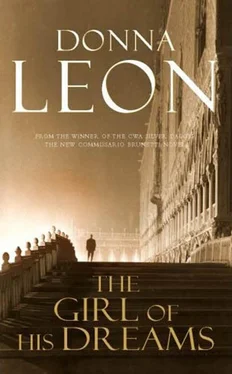Brunetti did not have long to wait for Dottor Calfi to return his call: the phone rang only minutes after Vianello had gone back down to the squad room. Brunetti lifted the phone and gave his name.
'Commissario, this is Edoardo Calfi. You asked me to call’ The voice was a light tenor, the accent Lombard: perhaps Milano.
'Thank you for calling, Dottore. As I told you in my message, I'd like to ask you some questions about patients of yours.'
'What patients are those?'
'Members of a family known as Rocich,' Brunetti said. 'They are nomads living in the camp near Dolo’
‘I know who they are,' the doctor said sharply, and Brunetti began to think the call was going to be a failure. This impression grew stronger when Calfi added, 'And they are not "known as" Rocich, Commissario: it is their name’
'Good’ Brunetti said, working to keep his voice calm and pleasant. 'Could you tell me which of the family members are patients of yours?'
'Before I do, I'd like to know why you're asking this question, Commissario.'
'I'm asking you, Dottore’ Brunetti said, 'in order to save time.'
'I'm afraid I don't understand.'
'With a judge's order, I could perhaps get the information from the central records in that district, but since these are questions I'd like to address to their doctor personally, I'm trying to save time by establishing that they are your patients.'
'They are’
'Thank you, Dottore. Could you tell me which members of the family you've treated?' 'All of them.' 'And that would be?'
'The father and mother, and the three children’ the doctor answered, and Brunetti fought down the impulse to say he made it sound just like the three little bears.
'It's about the younger daughter I'd like to ask information, Dottore.'
'Yes?' The doctor's voice was cautious.
'I'd like to know if you've ever treated her for a venereal disease’ Brunetti said, as if she were still alive.
That was quickly put paid to by the doctor, who said, 'I do read the newspapers, Commissario, so I know Ariana is dead. Why do you want to know if I treated her' – he asked, placing great emphasis on the past tense – 'for this sort of disease?'
'Because signs of gonorrhoeal infection were found during the autopsy’ Brunetti said in a neutral voice.
'Yes, I knew about the disease’ the doctor said. 'She was under treatment for the problem.' Brunetti forbore to ask whether, as a doctor, he had thought it proper to report this 'problem' to someone at the social services.
'Could you tell me how long she had been under treatment?'
‘I don't see how this is relevant’ the doctor said.
Brunetti doubted that but answered only, 'It might help us in our investigation of her death, Dottore.'
'Some months’ Calfi acquiesced by saying.
'Thank you’ Brunetti said, deciding not to ask for clarification but to settle for what he could get.
'I'd like to say something if I may’ the doctor began.
'Of course, Dottore.'
'This family has been in my care for almost a year. And during that time I've come to take a great interest in them and in the troubles they meet with here.' At this point, Brunetti could pretty well predict what he was going to hear. Dottor Calfi was a crusader, and he knew he could do nothing more with crusaders than listen to them, agree with them entirely, and then try to get out of them what he wanted.
'I'm sure many doctors come to feel a strong concern for their patients’ Brunetti said in a voice he washed clean of any sentiments save warmth and admiration.
'Life's not easy for them’ Calfi said. 'It's never been easy for them.'
Brunetti made a noise of assent.
For the next few minutes, Calfi catalogued the misfortunes of the Rocich family, at least the version he had been given of those misfortunes. All of them had, at one time or another, been the victims of brutality. Even the wife had been beaten by the police in Mestre, one eye blackened and her neck badly bruised on both sides. The children had suffered persecution in school and were afraid to return. Rocich himself was unable to find work.
When the doctor stopped speaking, Brunetti asked, voice warm with concern and fellow feeling, 'How did the child contract the disease, Dottore?'
'She was raped,' Calf! said indignantly, almost as if Brunetti had tried to deny this or had perhaps been involved in some way in the deed. 'Her father told me that she was walking back to the camp late one afternoon and was offered a ride by a man in a big car. At least that's what she told him.'
‘I see,' said a very concerned Brunetti.
'The man pulled off the road on the way to the camp and raped her’ Calfi said, voice rising with anger.
'Did they report it to the police?' asked an equally angry Brunetti.
'Who'd believe them?' Calfi asked in a tone now of indignant disgust.
Not many, thought Brunetti, but what he said was, 'Yes, you're probably right, Dottore’ Using the same tone, Brunetti asked, 'Did they bring her to you?'
'Not until some months later’ the doctor explained, then before Brunetti could ask about this, added, 'She was ashamed about what had happened, so she wouldn't let them bring her to me until there were symptoms they couldn't ignore.'
'I see, I see’ Brunetti said, then allowed himself to mutter an audible, 'Terrible.'
'I'm glad you see it that way’ the doctor said, and Brunetti had to admit that he did indeed think the whole thing was terrible but not, perhaps, in the same way the doctor did.
'Did anything similar ever happen to. any of the other children?' he asked.
'What do you mean, "similar"?' the doctor asked in a sharp voice.
Brunetti shied away from the idea of sexually transmitted disease and said, 'Violence from the people in the area.' He decided to risk it and added, 'or from the police?'
He could almost feel Calfi calming down when he heard this.
'Occasionally, but the police seem to prefer exercising their violence against women,' Calfi said, quite as if he had forgotten he was talking to a policeman.
Brunetti decided to get out while the going was good and so expressed his thanks to the doctor for his help and for the information he had given.
With a mutual exchange of courtesies, the men hung up. 'Their violence against women,' Brunetti repeated, the phone in his hand. He replaced the receiver.
That left him the Fornaris. It would be advisable, he knew, to let Patta decide on the wisdom of going to speak to them again, or perhaps it would be better to leave that decision to the examining magistrate, but Brunetti chose to see his visit not as an investigative one so much as an attempt better to clarify the likelihood that the child had died in a fall from their roof. Signor Fornari should have returned from Russia by now: Brunetti wondered if he shared his wife's lack of curiosity about the Gypsy girl, found dead so close to their home.
Brunetti walked along the Riva degli Schiavoni, filtering through the people walking in his direction or coming towards him, and as he walked, he had the sensation of being observed. He paused occasionally to study the wares on offer in the ever-increasing number of waterside stalls: football-team flags, gondolieri boaters, thick velvet court jester hats, ashtrays – one from Capri – and the omnipresent plastic gondolas. He stood in front of each horror in turn, his attention radiating out to both sides. He replaced the gondola on the counter and swung around, studying the people behind him, but he saw no sudden motion. He thought for a moment of taking a vaporetto: this would force anyone who was following him to abandon the pursuit. But curiosity overcame him and he continued to walk, even slowing his pace to allow whoever it was, if anyone, to keep up with him.
Читать дальше





![Theresa Cheung - The Dream Dictionary from A to Z [Revised edition] - The Ultimate A–Z to Interpret the Secrets of Your Dreams](/books/692092/theresa-cheung-the-dream-dictionary-from-a-to-z-r-thumb.webp)






